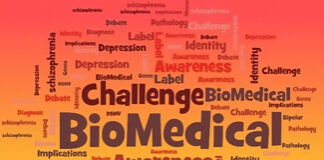Tag: biomedical model
Using Paint, Pen on Paper or Song to Revisit Trauma
From The Conversation: The literary, visual, and performing arts can play an important role in helping people process trauma, especially for those who have difficulty...
Thomas Insel Leaves the Google-Spawned Verily for a Start-Up
From Wired: Thomas Insel, neuroscientist and former head of the National Institutes of Mental Health, is leaving his role at the Google-spawned health science company...
Trump’s Pick for Mental Health ‘Czar’ Highlights Rift
From The New York Times: President Trump's nominee to direct SAMHSA, Dr. Elinore McCance-Katz, who is a strong proponent of the medical model of psychiatry,...
Trump’s Pick to Run Mental Health
From STAT: President Trump has nominated Dr. Elinore McCance-Katz, a proponent of increased psychiatric treatment for those diagnosed with serious mental illness, to run the Substance...
ASAN Condemns White House Autism Proclamation
The Autistic Self Advocacy Network has voiced opposition to the President's autism proclamation and participation in Autism Speaks' "Light it Up Blue" Campaign. The...
Against the Biomedical Model of Mental Illness
From Invisible Illness: The biomedical model of mental illness is a reductionist paradigm that focuses excessively on locating biomarkers and neural correlates of emotional distress at...
Is Mental Illness Real?
From The Guardian: Conceptualizing emotional distress or suffering as the result of a biological, genetic illness may be stigmatizing and inaccurate, and may lead to...
Depression: Let’s Talk About how we Address Mental Health
From the Office of the United Nations High Commissioner for Human Rights: United Nations Special Rapporteur Dainius Pūras calls for our global community to rethink...
Why the Hype Around Medical Genetics is a Public Enemy
From Aeon: Throughout history, scientists have made inflated promises about medical genetics, vowing that the field will prevent or cure all diseases. These hyperbolic and grandiose...
Changing the Stories we Tell Ourselves can Change our Lives
In this piece for The Nerdy Herbalist, one woman shares the way that framing her mood experiences as dangerous gifts, not symptoms or disorders, has impacted...
Time to ‘Drop the Disorder’
It was February 2016, the UK-EU referendum debate was beginning to warm up and my tolerance for absorbing toxic tweets and frustrating Facebook posts was dwindling fast. What then pushed me over the edge was yet another celebrity-inspired media frenzy about a psychiatric “illness.”
Unhelpful Utterances: 6 Comments We Should No Longer Hear From Mental...
Professionals are paid to share their wisdom with those who are, typically, less informed. But, when dealing with mental health professionals in the psychiatric arena, it is wise to retain a degree of skepticism about the words spoken by the doctors and nurses commissioned to help reduce human misery and suffering.
NIMH Info for Parents on “ADHD” Misleading, Researchers Say
A new analysis of the information that the National Institute of Mental Health (NIMH) publishes for parents about attention deficit hyperactivity disorder (ADHD) concludes that the children’s experiences and contexts are ignored and that medication is presented, misleadingly, as the only solution supported by research evidence.
The Mental Health Channel & Beyond: What Does it Really Mean...
How are we going to get anywhere at all if people believe that speaking to alternatives just means occasionally putting something out there that isn’t about psychiatric drugs? Assuming that the Mental Health Channel folks genuinely believe they’re offering a product that’s ‘well-rounded,’ how do we even get to a point where they understand why it’s not, and can make a well-reasoned decision about where to go from there? Yes, it’s about the drugs. But, in some ways, no, it’s not at all about them. It’s about the damage we do by convincing people that there’s no other choice than to take the drugs because of a ‘chemical imbalance’ or ‘chronic brain disease’ that, just like cancer, will only get worse if it goes untreated. It's about the inescapable nature of the boxes people put us in (even some of those boxes not filled up with pills).
Brain Imaging Reveals Psychiatric Disorders are Not Neurological Disorders
Some researchers have been arguing to reclassify all psychiatric disorders as diseases of the brain and nervous system, similar to epilepsy or Parkinson's disease. Neuroimaging research, however, reveals that psychiatric disorders appear to be distinct from neurological disorders, according to a new study published in this month’s issue of the British Journal of Psychiatry.




















